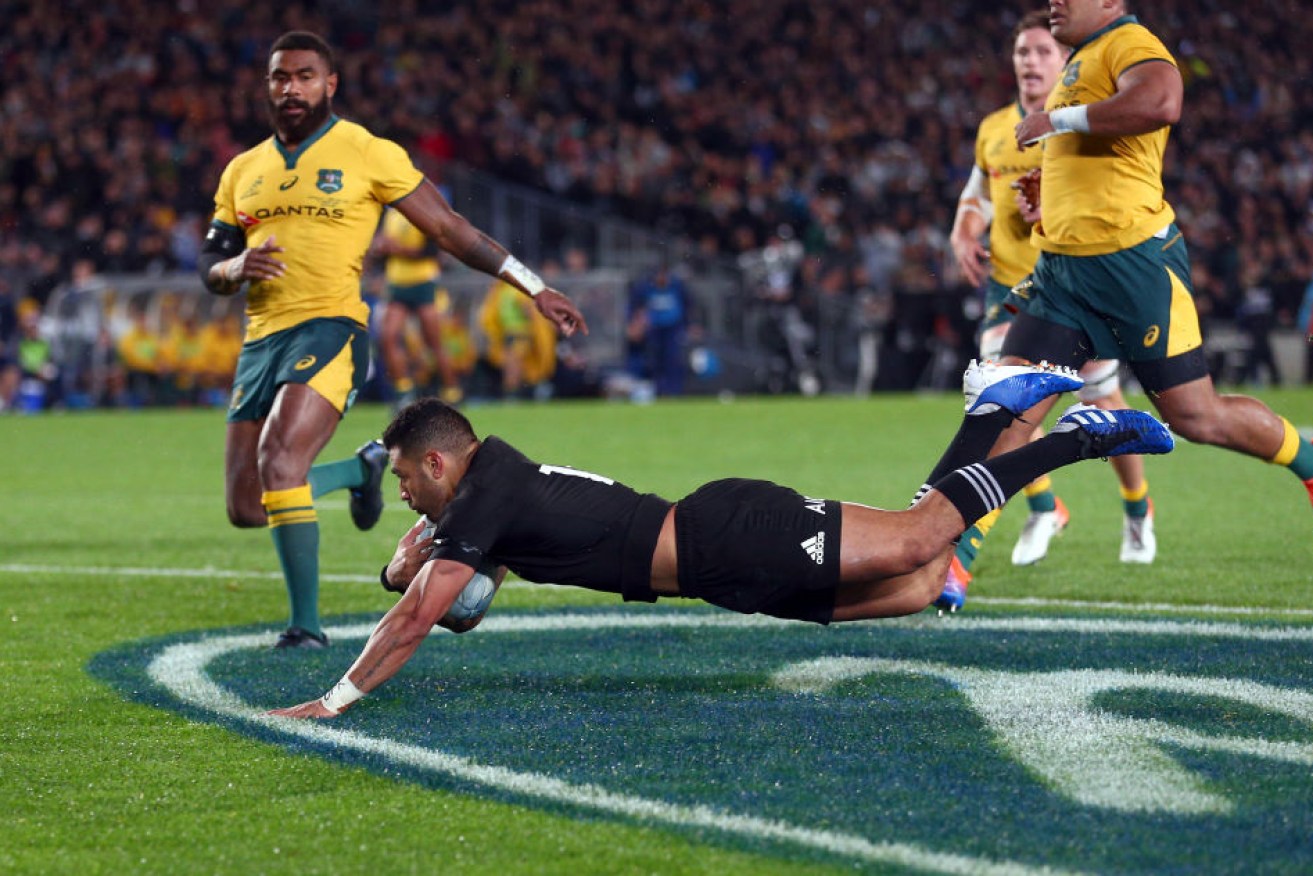The upside for the Wallabies – no, seriously


Richie Mo'unga scores New Zealand's first try in the Eden Park test. Photo: Getty
You might think the Australian rugby media that were talking up the Wallabies and (foolishly) talking down the All Blacks last week have joined the election pollsters for a period of quiet self-reflection.
Yes, it was an demolition.
The 36 was bad; the 0 was worse; and a seven-man All Blacks scrum destroying the eight-man Wallabies unit was … absolute embarrassment.
Yet there is upside. No, seriously. There can be benefits in this drubbing before the Rugby World Cup.
The All Blacks over two weeks gave us several lessons that we can learn from and exposing crucial failures that can be fixed means, well, there’s the chance to fix them.
Encouragingly, the fixable failures were mainly about being smarter and better prepared, rather than any intrinsic weakness in the cattle.
In no particular order:
- There is no mileage in kicking the ball to the world’s best attacking rugby player, Beauden Barrett. A team wiser for the experience will not do that again. Kicking to him in plenty of space is particularly stupid

Do not, repeat, do not kick the ball to Beauden Barrett. Photo: Getty
- Giving the ball to any of the Kiwis in plenty of space is not smart. Their kicking game on Saturday night was a lesson – if not at length for touch, short enough to provide plenty of chasers and competition for the catch
- A kick without effective chasers that doesn’t go deep into touch is merely surrendering possession, giving the ABs the opportunity to score
- A lesson from the Under-10s manual: It’s better to gain 10 metres and keep the ball than 20 metres and surrender it.
A couple of times a Wallaby made a good break – and found he had little support.
When a prop (albeit a wonderful prop) is the only support for a promising break downfield, something is seriously lacking among those who are supposed to be the quicker members of the team.
- A related matter: The Wallabies need more speed in the back row. We urgently need a faster, more agile No.6, preferably a fit David Pocock
- There was only one aspect of the game in which the Wallabies were superior, not because the Wallabies were great at it but because the ABs weren’t great: The lineout.

The lineout – the one bright spot for the Wallabies. Photo: Getty
So a smart team would attempt to play to that strength, aiming to kick the ball out instead of to an All Black. (Yes, that again.)
- Sorry, more about kicking: The box kick – really? As good as our two halfbacks are, what are the percentages on their box kicks?
A plea to rugby commentators: Please don’t exclaim “box kick!” every time the half does one. It’s a bit like shouting “he has two hands!” – we can see that. And I think it only encourages them.
- The ABs gave us a lesson about the seven-man scrum while they were being beaten in Perth: If your scrum is not clearly dominant, get that bloody ball out there immediately. Being down a man did not trouble them on their own feed.
The ease with which the ABs quickly cleared the ball in Perth was amazing. It demonstrated heaven-knows how many man years of scrum practice on just that single aspect of the dark art.
The Wallabies need to study the tape, learn the lesson and pack a few million more scrums until they can do it too.
As for that seven-v-eight demolition, it will make a fine motivation video to play before every forwards’ training session.
- White Line Fever is a terrible thing. When playing with a penalty advantage, continuing to batter away in the forwards close to the line is not the only option, especially when it doesn’t work. After a couple of rumbles, spinning it to a big, bruising inside centre or a similarly big, bruising winger coming in on an angle might be worth trying – if only to lift fans’ hopes.
The splendid Mr Kerevi repeatedly broke the gain line.
The wonderful Mr Koroibete also would be extremely difficult to stop at speed a few metres out. We never gave them the chance, even with the ref playing advantage. Dumb rugby.
- Similarly, if something clearly isn’t working, don’t keep attempting it. While our ability to win a lineout was good, our attempts to subsequently roll a maul from it were largely embarrassing
- When stretched wide without support, and unless there’s clear open space in front of him, there’s very little benefit in delivering a final pass to a man on the sideline who’s covered. If the pass is poor and the ball is dropped, ABs have a funny habit of scoring tries from it. Lesson learned, expensively.
Tweet from @AllBlacks
That’s enough for now. Those few little matters attended to, the half-time score could have been very different on Saturday night.
Despite being down 17-0, the Wallabies were not out of the game in the first half. They were frustrating to watch, opportunities not taken, silly mistakes made, but they were having a good crack.
For all the superior passion and commitment the All Blacks brought to the game for 80 minutes, it wasn’t embarrassing to be wearing gold until the second half when the horse had bolted.
A closer score, as it should have been after 40 minutes, and the horse would be less likely to gather speed.
So it goes.
And we can all look forward to the next Test to see those problems fixed, to find out what happens next. It’s part of why we love the game.








